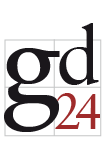Invited Speakers
Otfried Cheong
SCALGO, Denmark
Title:
How Can Biclique Covers Help in Matching Problems
Abstract:
In several settings one encounters assignment or matching problems between objects of two different types, and needs to run a computation on a bipartite graph. While this graph can potentially be dense, it can sometimes be represented compactly using a biclique cover. This is in particular often the case when the objects are geometric - we will look at examples, and see how recent progress on maximum flow can be combined with such biclique covers to obtain faster algorithms.
Biography:

Otfried Cheong received his Ph.D. in mathematics from FU Berlin, and has held academic positions at Utrecht University, Postech, Hong Kong University of Science & Technology, TU Eindhoven, and KAIST. He now works for SCALGO, designing and implementing algorithms for water flow simulations. He is the author of the vector graphics editor 'Ipe', and one of the authors of a well-known text book on computational geometry.
Monika Henzinger
Institute of Science and Technology Austria
Title:
How Can Algorithms Help in Protecting our Privacy
Abstract:
Decisions are increasingly automated using rules that were learnt from personal data. Thus, it is important to guarantee that the privacy of the data is protected during the learning process. To formalize the notion of an algorithm that protects the privacy of its data, differential privacy was introduced by Dwork, McSherry, Nissim, and Dwork in 2006. It is a rigorous mathematical definition to analyze the privacy properties of an algorithm – or the lack thereof. In this talk I will give an introduction to differential privacy with an emphasis on differential private algorithms that can handle dynamically changing input data.
Biography:

Monika Henzinger is a professor of Computer Science at the Institute of Science and Technology Austria (ISTA). She holds a PhD in computer science from Princeton University (New Jersey, USA), and has been the head of research at Google and a professor of computer science at EPFL and at the University of Vienna Monika Henzinger is an ACM and EATCS Fellow and a member of the Austrian Academy of Sciences and the German National Academy of Sciences Leopoldina. She has received several awards, including an honorary doctorate from TU Dortmund University, Two ERC Advanced Grant, the Leopoldina Carus Medal, and the Wittgensteinpreis, the highest science award of Austria.

